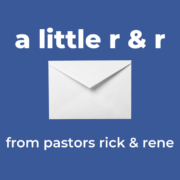a little r & r

One thing we don’t expect from the scriptures is humor—not “Ha! Ha! Humor” we think of, but humor, nonetheless. Sometimes the humor is obvious: Like a scene in the Old Testament right out of an episode of the old sitcom “Mr. Ed,” the talking horse. Except this time, it’s a donkey who scolds the military leader Balaam for disobeying God’s insistence for Balaam not to co-operate with the Moabites. Or when Jonah pouts because he’s pissed-off at God for making him go to the City of Nineveh and demand their repentance. When the Ninevites repent, Jonah sulks because he’d hoped God would nuke them and wipe them off the face of the earth!
But more often the humor is subtler and ironic: Like when the devil quotes scripture while tempting Jesus in the wilderness. Who knew the devil knew the Bible? Sometimes the church’s adversaries know our playbook better than we do!
The pinnacle of humor occurs in John’s Gospel when the Roman Prelate Pilate asks Jesus “What is truth?” It’s a question John believes the faithful should be asking, not their enemy! The question is John’s way of needling 2 sets of his listeners: the Docetists, who believe they have an exclusive app no one else has to buddy up with God, and the “Antinomians,” who believe their freedom in Christ sets them above all law, including God’s!
Know anyone like the Docetists and Antinomians these days?
Certainly no one person or group has a corner on the truth, like the Docetists assumed they did. If they do, they’ve committed the mother of all the 7 deadly sins: Pride!
Furthermore, we’re all troubled and bewildered by the mess and polarization we see in our country today. Anyone who isn’t confused & depressed, these days isn’t paying attention.
We wonder how can this be happening in this land we love?
I can’t pretend to know the answer, though, of course I have my ideas. Yet, I know neither I nor anyone else can capture all the nuances & complexities of our troubles.
Still, I wonder if we aren’t witnessing a period in contemporary history when two ways of interpreting the truth, of defining how we know what we know, and answering Pilate’s question, “What is truth?” aren’t colliding and leaving us all feeling angry and befuddled.
One way is modern, fixed, and thoroughly nostalgic, enough so those who typify this mindset are willing to rewrite history to their liking and deny any reality they find inconvenient. This way is binary. It divides life into black and white, with no gray. In James Fowler’s classic book “(The Six) Stages of Faith,” folks who follow this initial way of knowing are stuck at Level 3 of a possible 6 levels—in which spirituality is reduced to division between good and evil, heaven or hell, true or false, with me or against me. These folks embrace disinformation.
In this fixed worldview of life is a zero-sum game. There are only winners & losers. This view has left a widening gap between rich (the winners) and poor (definitely, the losers).
Ironically (one form of humor is irony) is how many on the American Religious Right fit the worst aspects of modernism without knowing it. When I say “modern” here I mean that movement which began with the Renaissance when seeds of the belief that humankind can solve any problem no matter how challenging or complex, were planted. Anyone who even hints that they know all the answers is guilty of modernism’s worst instincts.
Of course, the Christian Right might reply, their belief in Jesus is sufficient even if they mean science-be-damned or deny that God might do a new thing (like be revealed in and through scientific or medical progress). But their faith assumes life should be a narrow, closed moral system, despite the fact Jesus once said, “Why do you call me good? No one is good but my Father in heaven.” This is not to say churches and supporters of evangelical churches never experience blessing nor ever offer blessing to the world. Undoubtedly, they do.
But beyond the realm of the spiritual, the Christian Right is leaving a questionable cultural influence, or should I say “sinfluence” damaging to our nation in this volatile time.
More ironic, the Christian Right is replicating modernism’s (and liberalism’s) greatest mistake of acting as if faith is static and not dynamic and need never change. The great classic liberals of the late 19th century: Marx, Freud, & theologian von Harnack, were overly optimistic that humankind could solve any problem without any need of God. Truth, as often defined by both ultraconservatives and ultraliberals, functions in a closed system, when again, God might be up to a new thing! Believing God can do a new thing suggests an open, not a closed system! “New occasions DO teach new duties,” as poet James Russell Lowell said after the Civil War.
The death of this kind of prideful hubris began with the rise of Nazism and the Holocaust, followed by World War II. These events called into question modernism and classic liberalism’s hope in humanity’s ability to solve any problem be it scientific, cultural, or spiritual.
But there is a second answer for understanding “What is truth?” It is the post-modern understanding, held often, though not exclusively by younger generations. Post-modernism has many attractive attributes: It is fluid instead of fixed. It is more comfortable with ambiguity than our more highly anxious and insecure alternative group. This makes the post-modern perspective more adaptive to change in an era of rapid technological and cultural change. Postmodernism’s hallmark is its willingness to advance gender, racial & ethnic diversity.
But postmodernism also comes with its own set of problems. For one, it says there are no absolutes, and, therefore, only marginal recognition of a need for God, whom philosopher Charles Hartshorne in his book The Divine Relativity, says is the only absolute in creation. But in post-modernism everything is relative. There is only ambiguity and no certainty. In this sense post-modernism is also guilty of the same hubris of modernism. It avers, “We don’t need God!” We can figure it all out ourselves. There is no place for the transcendent. Postmodernism is both iconoclastic of eternal values, and idolatrous of penultimate values.
This is at the core of the Christian Right’s nostalgia for “MAGA” and disdain for anything that hints of liberalism and socialism (though our nation’s founders—fully capitalists—set the American Constitution as the acme of a social democratic document).
While I present these two colliding forces at work in polarization, both perspectives have their strengths and their weaknesses if I have accurately represented them. Thing is: Jesus likely never intended to bestow upon us an ideology but a spiritual relationship; a loving relationship between ourselves and God and a loving relationship between each of us and our neighbor.
The apostle Paul gives us this criterion for adjudicating all kinds of conflict in his First Letter to his multiple-polarized Corinthian community. He said, “If I have prophetic powers, and understand all mysteries & all knowledge, & if I have all faith, so as to remove mountains, but have not love, I am nothing.” He is talking about what IS absolute, relevant, and ultimate here: God’s unconditional love.
We are living in one of the most negative times in all human history, in a post-truth world. These times are marked by several words starting with the letter or sound “N.” Nihilism: Nothing has meaning. Nominalism: Words mean nothing or only what each person says they mean. Narcissism: No one counts except me, unless I say they do. And Gnosticism with its silent “G:” Only I know the truth and no one else. These philosophies may help explain our times, but they are all empty, vacuous, and wanting as cornerstones for building our spiritual house on.
But the apostle Paul is right! There really is only one thing that ultimately matters in life, in faith, in family, in culture, among all nations, and in all the world: LOVE!
Blessings! Rick



